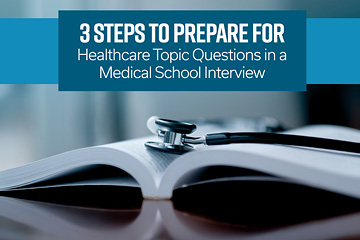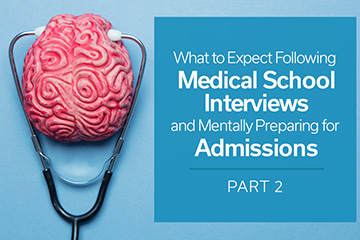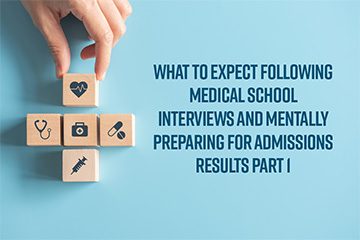
3 Steps to Prepare for Healthcare Topic Questions in a Medical School Interview
Being able to discuss healthcare topics critically is a crucial part of the CASPer test and medical school interviews, but also the entire career of a physician or healthcare worker. Although we may be familiar with certain topics, we may not be able to talk about them articulately on CASPer or interviews. For instance, are you ready to answer the following questions?
- What are the concerns with homelessness, and how might we address this problem?
- Should we reduce physician pay to address rising healthcare costs?
- It has been suggested that to promote healthy lifestyles, medical schools preferentially admit students who do not smoke. Do you think this approach will be effective? Discuss the implications with respect to health and health care costs.
These exact questions may not appear on your CASPer test or in your interview, but questions like these certainly will. If you struggled to answer these questions, please read on to learn how you can be prepared to discuss health care topics when the occasion arises.
1. Learn
There is a plethora of topics to learn about. The most important topic is to understand the structure of our healthcare system in Canada. The best resource for this is the concise section titled “The Canadian Healthcare system” in the Toronto Notes (https://torontonotes.ca/). At the end of this blog post is a list of topics you can explore as a starting point. You will not be able to prepare for every topic you may be asked about; however, studying healthcare topics generally will help you answer questions about healthcare topics you have encountered for the first time. The following are some resources you can consult:
Books
- Better Now: Six Big Ideas to Improve Health Care for All Canadians by Dr. Danielle Martin
- Toronto Notes first Section
- The Canadian Healthcare System
- Ethical and Legal Issues in Canadian Medicine
- Matters of Life and Death: Public Health Issues in Canada
- Treating Health Care: How the Canadian System Works and How it Could Work Better by Dr. Raisa Deber
Websites
- Healthydebate.ca
- https://www.cmaj.ca/
- CBC.ca and especially https://www.cbc.ca/news/health
- Regional specific to a certain medical school E.g., Hamilton Spectator for McMaster University
Podcasts
- White Coat Black Art
- TEDTalks Health Podcast
- Solving Healthcare with Dr. Kwadwo Kyeremanteng
- Canadian Medical Association Journal Podcast
- Listening to CBC radio (99.1) is a great way to be aware of a wide variety of issues in Canada and the world
2. Notes
It is important to take notes to make consolidate information and reinforce your learning. I suggest working on a shared document with friends. There are generally two types of questions asked about healthcare topics. The first is to discuss a solution, policy, or an idea, such as “should hospitals charge patients for parking?” Use the following structure to organize your thoughts and notes:
- Pros
- Cons
- Alternatives
- Choice and justification
- Summary
The other type of question is a general problem or topic, such as “how can we address the opioid crisis?” For these types of questions, use the following structure:
- Concerns
- Key statistics
- Think of 1-3 solutions
- Pros and cons of each
- Summary
When making your notes and when answering questions about healthcare topics, make sure to consider multiple perspectives by looking through the lens of ethical principles (e.g., beneficence and resource allocation) and different stakeholders:
- Your own experience
- People most directly affected
- People who are less close to the issue but still impacted
- Institutions
- Society as a whole
3. Practice
The most important part of being prepared to discuss healthcare topics is to practice as if you are doing the CASPer test or doing an interview! It is far more important to do practice than having copious amounts of notes.
- When practicing, provide your responses according to the structure of how you take notes and aim for an answer that is 3-5 minutes long (if preparing for an interview)
- Find practice questions on healthcare topics or make your own—there are many available that you can find. A quick Google search will reveal many question banks, and you can reach out to medical students who are likely to be happy to share their resources.
- Practice these questions with your friends or record yourself.
- Make sure to check whether you provided your answer according to the right structure.
- Prioritize your practice time according to the rest of the questions you may be asked (e.g., situational judgement ethics). I would suggest studying healthcare topics should take up about 20% of the practice questions you might do, but you can increase that if you are struggling with these questions.
These are some topics to consider studying. What is important is to not get caught in the weeds and instead focus on high-yield topics.
- Healthcare Approaches
- Increasing primary care
- Preventative medicine
- Holistic medicine
- Alternative medicine
- Evidence-based medicine
- Precision medicine
- Medicine as an art
- Overmedicalization
- Social Determinants of Health
- Various social determinants
- Poverty
- Homelessness
- Universal basic income
- Diversity and Inclusion
- Race and health
- Indigenous health
- Rural health
- Disability / ableism
- LGBTQ2S+ health
- Diversity in medicine
- Issues of Health Care System
- Public vs. Private Healthcare
- Wait times
- High healthcare costs
- Universal pharmacare
- Uninsured health services
- End of Life Care
- Senior health
- Palliative care
- Medical Assistance in Dying
- Caregiver Burnout
- Mental Health and Addiction
- Mental health crisis
- Opioid crisis
- Legalization of substances
- Suicide
- Infectious Disease
- COVID-19
- Vaccinations
- Vaccine Inequities
- Vaccine hesitancy and anti-vaccination
- Antimicrobial resistance
- Technology
- Fake news / misinformation
- Telehealth / telemedicine
- Electronic medical records
- Artificial intelligence
- Social media use in medicine
- Gene editing / CRISPR
- Medical Profession
- Culture of medicine
- Physician compensation
- Shortage of doctors
- Expanding role of allied health professionals
- Miscellaneous
- Gun control
- Medical tourism
- Drug industry / big pharma
- Climate change






